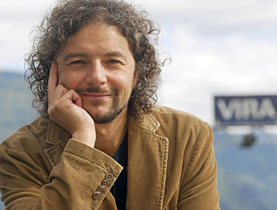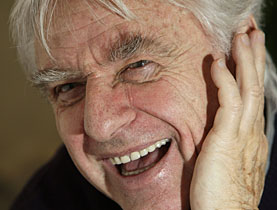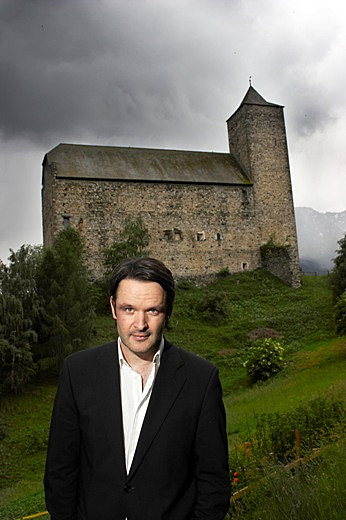The theatrical life of a nomad

Swiss theatre prize 2008 winner Daniele Finzi Pasca tells swissinfo about his career as a clown, director and choreographer around the world.
The Italian-speaker, a former winner of the public choice Swiss Award for theatre, has worked with the prestigious Cirque de Soleil and choreographed the closing ceremony of the Turin Winter Olympics in 2006.
He is also the founder of the Lugano Sunil Theatre.
swissinfo: Director, author, choreographer, clown – you are a very talented person.
Daniele Finzi Pasca: Let’s start with being a clown. In the theatre tradition clowns are in some ways always their own directors and writers. Perhaps because we are megalomaniacs, or because we think about theatre in a particular way.
A clown-actor dances with the public, at least that’s how I think of being on stage. I dance, seek out the public, I take them into my arms, I lead them and I let them lead me. This form of expression needs you to be able to think about gesture in all its complexity.
swissinfo: How do you build up a relationship with the public?
D. F. P.: The best analogy is perhaps that of trying to lull a baby to sleep. For this purpose an actor re-enacts the gestures and actions that he has learned. He knows what needs to be done because it’s intuitive. But he can’t repeat these actions mechanically because the act of lulling to sleep has to be continuously adapted. This is because every baby is different and each night is different for the baby.
That’s why people talk about an art. A person learns techniques for understanding things. And if he has the talent, he develops listening skills as well. It’s not what is happening inside you, but what is going on around you. Being able to adapt continuously, as a way of responding to others, is therefore fundamental – to make people laugh and dream.
swissinfo: What did working with the [Montreal-based] Cirque Eloize mean to you?
D. F. P.: My partner, Julie Hamelin, is one of the founders of this troop. Meeting Cirque Eloize seven years ago made me go back to acrobatics a bit. Together we developed a project which brought together their world and some of my ideas. This gave surprising results. We were able to present shows the market did not expect and in very unusual places, such as Broadway.
swissinfo: The Turin Olympic Games and the Cirque de Soleil, were these other worlds?
D. F. P.: These are situations where you have to deal with other dimensions. My theatrical training was a great help. Perhaps I should explain that there are essentially two different approaches in theatre. It’s like in sculpture, where there’s the model and the sculptor.
I’m the second one and for this you have to know exactly where you are going from the very first movement of the chisel. There’s no room for improvisation. This rigour, linked to an architectural vision of the show, helped me work out these larger projects, where you could not improvise.
swissinfo: What has made most impact on you during your travels?
D. F. P.: It would be a shame not to list all of the moments. There are, however, some that stand out. In Uruguay we had an audience of 40,000 for the Icarus monologue. The years in Mexico were important. And then there’s Canada, Eloize, Soleil, Carbone 14, not forgetting Ethiopia and India.
I have chosen to do a certain type of theatre, a nomadic theatre, because I really wanted to have this marvellous opportunity to travel. When travelling you meet people and you can breathe the air of a country. Each time it’s an experience which surprises me on a human level.
swissinfo: Many of your shows’ titles allude to the sky. What is your fascination with the heavens?
D. F. P.: There are people who never see green things because they live in the desert. There are others who don’t know what the ocean is. Everyone knows the sky, which is probably why I talk about it.
The sky is also the gods, mystery and fate. God is a great dramatist. That’s perhaps why there are so many tragedies, so many people suffering in the world. These are, at least, the answers I give to myself, when as a clown, I look up to the skies.
swissinfo: What do these two awards mean to you?
D. F. P.: They are magnificent gifts, especially as they come from my field. I didn’t know the Swiss Awards beforehand, so I was very surprised.
The theatre prize has a different value because it’s given by theatre people to theatre people… It’s not easy to do theatre. You need lots of determination as you are always fighting to get your idea, your dream, put forward. To receive this recognition from people I love and respect is an immense pleasure.
swissinfo-interview: Françoise Gehring
Finzi Pasca was born in Lugano, in the southern Italian-speaking canton of Ticino, in 1964, to a family of photographers. He is a director, author, choreographer and clown. He founded the Sunil Theatre in 1983.
He has written and directed around 15 works which have been seen worldwide. He has worked with Montreal-based Carbone 14.
Cirque Eloize, also from Montreal, Canada, invited him to write and direct their new project “Nomade – At night, the sky is endless” in 2002. “Rain – comme une pluie dans tes yeux” appeared in 2003. These shows toured the world.
In 2003 the Cirque du Soleil asked him to write and direct their new itinerant show, Corteo, which opened in April 2005 and is still on tour in North America. Nebbia, a collaboration between the Sunil Theatre and Cirque Eloize, is Finzi Pasca’s latest project.

In compliance with the JTI standards
More: SWI swissinfo.ch certified by the Journalism Trust Initiative


You can find an overview of ongoing debates with our journalists here. Please join us!
If you want to start a conversation about a topic raised in this article or want to report factual errors, email us at english@swissinfo.ch.